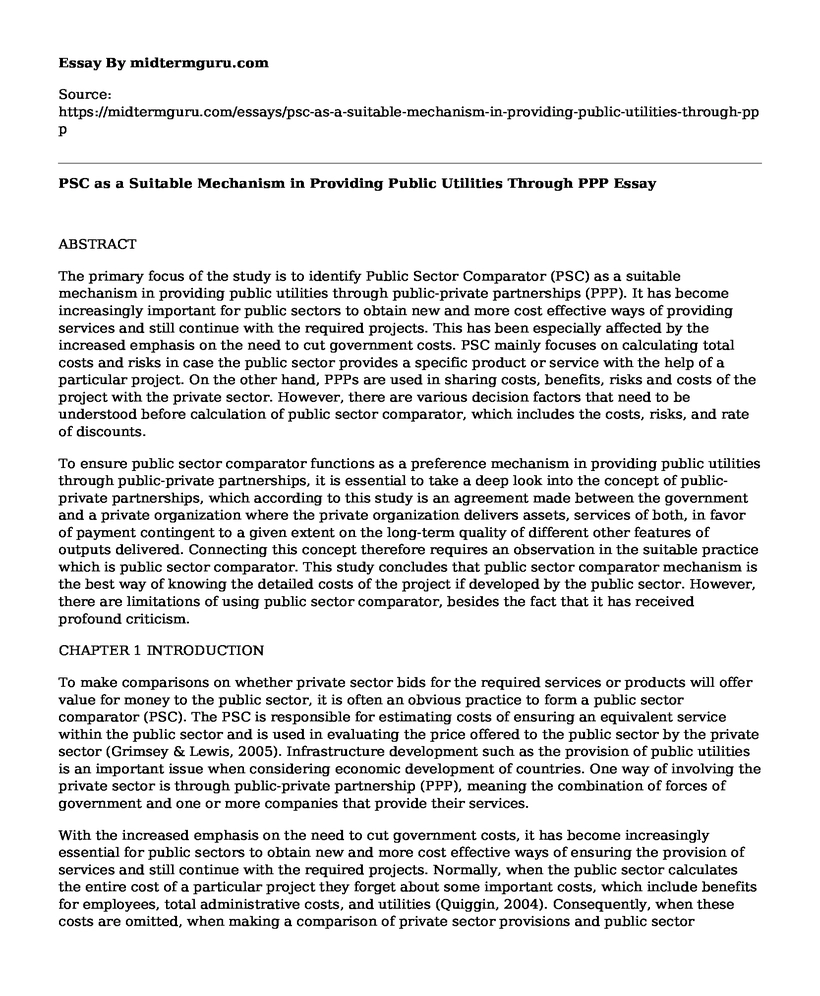ABSTRACT
The primary focus of the study is to identify Public Sector Comparator (PSC) as a suitable mechanism in providing public utilities through public-private partnerships (PPP). It has become increasingly important for public sectors to obtain new and more cost effective ways of providing services and still continue with the required projects. This has been especially affected by the increased emphasis on the need to cut government costs. PSC mainly focuses on calculating total costs and risks in case the public sector provides a specific product or service with the help of a particular project. On the other hand, PPPs are used in sharing costs, benefits, risks and costs of the project with the private sector. However, there are various decision factors that need to be understood before calculation of public sector comparator, which includes the costs, risks, and rate of discounts.
To ensure public sector comparator functions as a preference mechanism in providing public utilities through public-private partnerships, it is essential to take a deep look into the concept of public-private partnerships, which according to this study is an agreement made between the government and a private organization where the private organization delivers assets, services of both, in favor of payment contingent to a given extent on the long-term quality of different other features of outputs delivered. Connecting this concept therefore requires an observation in the suitable practice which is public sector comparator. This study concludes that public sector comparator mechanism is the best way of knowing the detailed costs of the project if developed by the public sector. However, there are limitations of using public sector comparator, besides the fact that it has received profound criticism.
CHAPTER 1 INTRODUCTION
To make comparisons on whether private sector bids for the required services or products will offer value for money to the public sector, it is often an obvious practice to form a public sector comparator (PSC). The PSC is responsible for estimating costs of ensuring an equivalent service within the public sector and is used in evaluating the price offered to the public sector by the private sector (Grimsey & Lewis, 2005). Infrastructure development such as the provision of public utilities is an important issue when considering economic development of countries. One way of involving the private sector is through public-private partnership (PPP), meaning the combination of forces of government and one or more companies that provide their services.
With the increased emphasis on the need to cut government costs, it has become increasingly essential for public sectors to obtain new and more cost effective ways of ensuring the provision of services and still continue with the required projects. Normally, when the public sector calculates the entire cost of a particular project they forget about some important costs, which include benefits for employees, total administrative costs, and utilities (Quiggin, 2004). Consequently, when these costs are omitted, when making a comparison of private sector provisions and public sector provisions, the public sector often look cheap compared to the private sector, which can be as a result of an incomplete calculation of the costs.
A public sector comparator provides calculations of the total costs and risks in case the public sector provides a specific product or service with the help of a particular project. The public sector comparator can, therefore, be used in comparing the public sector and provisions of the private sectors (Parker & Hartley, 2003). In case private sector provision is found to be more cost-effective, then the public sectors can choose to engage in a public-private partnership, which shares costs, benefits, risks and costs of the project with the private sector. However, there are various decision factors that need to be understood before calculation of public sector comparator, which includes, the costs, risks, and rate of discounts. The rates of discounts take into consideration the fact that high as well as low-risk factors are in question including their return on investments.
Typically, the rate of discount will reduce for public sector compared to the private sector since they have the ready public utility in place. Involved risks have to be limited to those that increase the total costs project costs. It is essential to engage every potential project (Edwards, 2004). It is also essential to take note of the fact that there are risks that are shared by the partner, while at the same time retaining others through individual partnership. Public sector compotator components are such as the raw public cost comparator, transferred risks, competitive neutrality and retained risks. Through including all the mentioned components, the public sector will be in a position to calculate the entire cost of a particular project and will in return be more efficient in their fund use.
The Context
There is an increasing investment demand to make improvements on the quality of public services. Governments worldwide and associated public sectors expect significant challenges as public resources are usually insufficient to meet the demands for increasingly new public utility projects in order to sustain and facilitate economic growth (Broadbent...
Cite this page
PSC as a Suitable Mechanism in Providing Public Utilities Through PPP. (2021, May 26). Retrieved from https://midtermguru.com/essays/psc-as-a-suitable-mechanism-in-providing-public-utilities-through-ppp
If you are the original author of this essay and no longer wish to have it published on the midtermguru.com website, please click below to request its removal:
- Questions on International Business Law and Its Environment: Regulating Trade
- The Birth of a Nation: Movie Review Paper Example
- Essay Sample on Low Fertility in Japan
- Paper Example on France and England Politics in 1600s to 1800s
- Recommendations for Constitutional Reforms in Grenada
- Paper Example on Colonial Period in Latin America
- Arabic Love for Nelson Mandela: Honouring the Bravery - Research Paper







